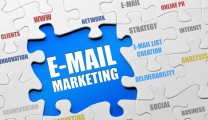What targeted email marketing is?
Targeted email marketing is a type of digital marketing that involves sending personalized and relevant emails to a specific group of people, based on their interests, behaviors, demographics, and other data. The goal of targeted email marketing is to build relationships with customers, increase brand awareness, and drive conversions.
In today's business landscape, targeted email marketing is more important than ever before. With the increasing use of digital channels and the abundance of information available online, customers are becoming more selective in their choices and are expecting personalized experiences.
Targeted email marketing allows businesses to effectively reach their target audience with tailored messages, leading to higher engagement and conversion rates. Additionally, targeted email marketing is a cost-effective and measurable way to build long-term relationships with customers, establish brand loyalty, and stay top of mind with potential buyers.

What targeted email marketing is?
Pros of targeted email marketing
- High level of personalization and customization: Targeted email marketing allows businesses to personalize emails based on customer interests, behaviors, and preferences, resulting in higher engagement rates and a more positive customer experience. By addressing the individual needs of customers, businesses can foster long-term relationships and build brand loyalty.
- Increased conversion rates: Targeted email marketing has been shown to have higher conversion rates compared to other marketing channels. By utilizing nowadays marketing management software sending relevant and personalized messages, businesses can increase the likelihood of customers taking action, such as making a purchase or signing up for a service.
- Cost-effective compared to other marketing channels: Targeted email marketing is a cost-effective way for businesses to reach their target audience. Compared to other marketing channels, such as television or print advertising, email marketing is relatively inexpensive, making it accessible to businesses of all sizes.
- Ability to track and measure results: Targeted email marketing provides businesses with the ability to track and measure the success of their campaigns, such as open rates, click-through rates, and conversion rates. This data can be used to make informed decisions about future campaigns and improve overall performance.
- Allows businesses to build long-term relationships with customers: By sending relevant and personalized messages, businesses can establish themselves as a trusted resource and build long-term relationships with customers. This can lead to increased loyalty and repeat business, as well as positive word-of-mouth recommendations.

Pros of targeted email marketing
Cons of targeted email marketing
- Risk of emails being marked as spam: One of the biggest challenges with targeted email marketing is the risk of emails being marked as spam. If customers feel that emails are irrelevant or unwanted, they may mark them as spam or unsubscribe, reducing the effectiveness of the campaign.
- The time-consuming process to create and manage email campaigns: Targeted email marketing campaigns require significant time and effort to create and manage. Businesses must invest resources in developing personalized messaging, segmenting their email lists, and managing the sending and delivery of emails.
- Requires a strong understanding of target audience and data analysis skills: Effective targeted email marketing campaigns require a deep understanding of the target audience, including their interests, behaviors, and preferences. Additionally, businesses must have data analysis skills to track and measure the success of campaigns and make informed decisions about future marketing efforts.
- Can be difficult to consistently generate high-quality content: To keep customers engaged, businesses must consistently produce high-quality content that is relevant and valuable. This can be challenging, particularly for businesses with limited resources or expertise in content creation.
- Dependence on email service providers: Businesses rely on email service providers (ESPs) to deliver their email campaigns. Any issues with the ESP, such as deliverability problems or technical glitches, can impact the effectiveness of the campaign. Additionally, businesses may be subject to changes in the policies and practices of the ESP, which can impact their ability to send emails.

Cons of targeted email marketing
Best practices for targeted email marketing
- Building an opt-in email list: It is important to build an email list of customers who have given permission to receive emails from your business. This can be done through various means, such as website sign-ups, social media, or in-person events.
- Segmenting and personalizing emails: To maximize the effectiveness of targeted email marketing, businesses should segment their email list and personalize emails based on customer interests, behaviors, and preferences. This can help to increase engagement and conversion rates.
- Designing mobile-friendly emails: With the increasing use of mobile devices, it is essential that businesses design mobile-friendly emails. This includes using responsive design, clear and concise messaging, and easy-to-click calls to action.
- Creating engaging and relevant content: To keep customers engaged and interested, businesses should create high-quality, relevant, and valuable content. This can include special offers, helpful tips, or educational resources that align with the interests and needs of the target audience.
- Monitoring and analyzing email performance: To improve the effectiveness of targeted email marketing, businesses should track and analyze the performance of their email campaigns, such as open rates, click-through rates, and conversion rates. This data can be analyzed by using best email marketing platforms to optimize future campaigns and improve overall performance.
In today's digital age, targeted email marketing remains a valuable tool for businesses to reach their target audience and drive conversions. By leveraging the power of personalized messaging and data-driven insights, businesses can build strong relationships with customers and achieve their marketing goals.












Replies to This Discussion